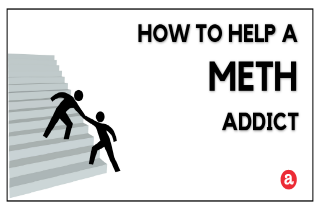Helping someone addicted to meth
Q: Can you help a meth addict quit?
A: Not until the person is ready.
Still, you’ll need to know what to expect before you can start helping an addict. Meth addicts can become physically dependent on meth. Because dependence is very difficult to resolve, methamphetamine addicts can become malnourished, medically ill, confused, paranoid, irritable, depressed and/or psychotic. Their cry for help may be following multiple days without sleep. In addition, their ability to process information, make decisions, regulate and express emotions can be significantly compromised.
So what is the process of getting help for meth addiction? We review here. Then, we invite your questions about meth use, abuse, or addiction at the end. We try to respond to all legitimate questions with a personal and prompt reply.
Stages of meth addiction treatment
1. Assessment
The first task in addiction treatment is to determine the severity of drug use and the level of “life functioning” in legal, family, medical and psychiatric arenas. Contact a doctor or a local addiction treatment provider to get a drug abuse assessment to determine levels of physical dependency as well as to evaluate the psychological state of a person addicted to meth. Assessment helps medical processions create a plan for the detox period and beyond to support both physical and mental health.
2. Detox and withdrawal
Understanding withdrawal is critical to helping someone addicted to meth. Symptoms can be intense, and both the acute withdrawal period as well as post-acute withdrawal require emotional and psychological support. In fact, you may need to consider detox options for the addicted person. Easing withdrawal symptoms can be important in the initiation of treatment to prevent relapse.
3. Psychological, behavioral, and/or pharmacological treatment
After a period of physical stabilization, an equally challenging stage of addiction treatment for meth addresses the compulsion to use. The goal of psychological meth addiction help is for the addict to develop new skills to address meth cravings and prevent relapses. Psychotherapy for addiction focuses on how a person thinks, and how that can affect feelings and actions. Talk therapy also helps patients identify and plan for triggers that set off substance abuse.
There are no known pharmacological treatments for meth addiction. However, medications are often prescribed address depression, anxiety, and/or psychosis that may result from meth use.
4. Follow up support
A person addicted to meth needs alternative coping mechanisms to provide positive options to drug use. Finally, follow up treatments and support group involvement help meth addicts to “recover” from drug addiction. When a recovering addict learns to manage his life more successfully, increase self-confidence, and to set positive personal goals….recovery is possible.
Helping a meth addict friend
One way to help a meth addict friend is to talk directly and openly about your concerns. This is called an “intervention”. Interventions work differently for each person. A licensed practitioner can help to guide individualized assessments and treatment plans, including a range of services from support groups to psychiatric care, until an effective plan is determined. However, there are few things to consider before discussing the issue with the meth addict:
Be safe – Never confront a person who is high on meth. Methamphetamine users frequently become psychotic from using meth, and their behavior could pose real danger to you. Talk at a time and in a place that feels safe. If the person becomes angry or violent, leave and bring up the subject later when everyone is calm.
Plan what to say – Tell them that you’re worried and that’s why you want to talk. Be specific about how you know that they are using and why you are concerned. You may want to have a hotline number or some facts on hand about real examples of people who have sought treatment and have overcome their meth addiction.
Listen – After you finish talking, ask what they think – and listen. It’s critical that you hear what they’re saying so you can offer to help. But you shouldn’t feel like you have to personally solve this problem – there are counselors and other professionals who are specially trained to help at times like this.
Keep at it – Getting someone to seek treatment might be a continuous process, not a one-time event. In highly structured interventions (led by professionals), the discussions are planned to guide the person from one step to the next in gaining sobriety and entering treatment, increasing the likelihood of success.
Self help meth addiction
Can an addict succeed in abstaining from meth with self help? Absolutely. But what does this include? Mainly, self help for meth addiction takes the form of regular face-to-face support groups. In fact, self-help groups can complement and extend the effects of professional treatment.
The most prominent self-help groups are those affiliated with Alcoholics Anonymous (AA), Narcotics Anonymous (NA), and Cocaine Anonymous (CA), all of which are based on the 12-step model. Most drug addiction treatment programs encourage patients to participate in self-help group therapy during and after formal treatment. These groups can be particularly helpful during recovery, offering an added layer of community-level social support to help people achieve and maintain abstinence and other healthy lifestyle behaviors over the course of a lifetime.
Get help meth addiction
Getting help for meth addiction includes seeking out any or all of the following services:
- Identification of addiction
- Intervention
- Drug abuse assessment
- Diagnosis
- Counseling
- Health care
- Psychiatric services
- Psychological services social services
- Follow-up procedures
Helping a meth addict questions
In sum, helping a meth addict requires information, planning, and care. Know what goes on during treatment and when to seek professional help. Then, schedule an intervention to talk about your concerns and treatment options.
You may still have questions regarding meth addiction programs. We welcome those questions in the comments section and will try to provide answers as quickly as we can.









Related Posts